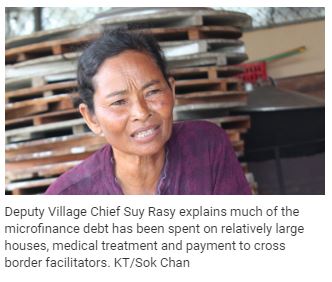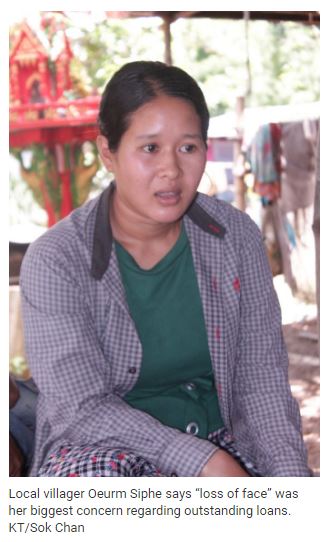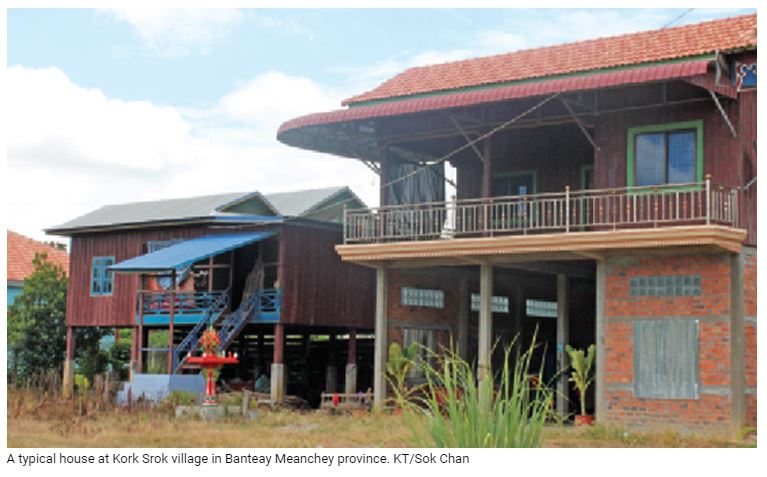Cambodia: Debt and migration during COVID-19
Strict Thai border closures, as well as water shortages, have caused increased financial hardship for villagers this year who had seen their incomes reduced as remittances from overseas fell and crops were damaged.
Khmer Times spoke to villagers and commune officials in Srah Raing communue in Banteay Meanchey province this week about their personal debt experiences after recent concerns were raised about Cambodia’s microfinance industry in this area.
It was revealed that the majority of those with worrying levels of debt had knowingly taken high-interest loans from multiple informal lenders against microfinance recommen- dations.
However, many of the villagers had no formal collateral deposited and were unsure of their legal rights in response to debt repayments, restructures and forced land repossessions for both the informal and formal sector.
Much of the debt was used to build relatively large houses, medical treatment and payment to cross-border facilitators after families sent their children to work in Thailand, where they could earn upwards of two to three times the average income in Cambodia.
The findings come after a local non-governmental organisation (NGO) released a video in May stating the microfinance industry was forcing land sales in the village based upon interviews dated in September last year.

According to the Deputy Village Chief Suy Rasy, “People here borrowed money to build big houses because they expected their income levels to continue and they would be able to repay their loans.As of this week, the deputy village chief and bank documents confirmed that no land had been either confiscated or sold to repay any informal or formal debt obligations in the village.
“However, now the borders have closed, our children cannot go to work in Thailand and drought has affected our crops. We have no idea how to earn more money to pay back our loans and the lenders keep asking us for money every day,” she said.
“Two of my sons have left for Thailand illegally after we paid 10,000 baht (about $320) to a broker for access,” she added.
Rasy said that the microfinance institutions had assisted her with allowing interest-only payments for six months. However, this would come to an end in November and no one in the village had lost or sold any land as of yet.
She added that she had borrowed from informal lenders over the past 20 years but recently started to borrow from microfinance institutions because they offered much lower interest rates.
“Informal lenders offer much more flexibility with payments and approvals but their interest rates are much higher than microfinance institutions, with informal lenders applying interest rates on a 1,000 baht loan at 3 to 5 percent per month while microfinance lenders are at 1.5 percent per month,” Rasy said.
Local villager Oeurm Siphe, said she has taken out multiple loans with both formal and informal lenders to repair her house and pay for medical treatment. But after the border was closed because of COVID-19, she and her family have struggled to meet the repayments every month.

“In total, I have borrowed 110,000 baht ($3,539) with three loans (two informal lenders and one microfinance lender) with interest payment more than 1,000 baht ($32) per month.
“Now the borders are closed my husband, via a cross-border facilitator who costs 3,200 baht ($102), goes illegally into Thailand where he can earn 400 baht ($12.50) per day in the construction sector,” she added.
Siphe added that she has another group loan which is a 20,000 baht ($640) debt, but only pays interest currently at 300 baht ($10) per month. This will end in December before reverting to principal and interest repayments.
However, she stated none of her loans were actually secured with any formal collateral arrangement and was instead secured by other members of the group.
“I have a group loan with three other villagers and if I cannot afford my repayments next year they will be required to pay my share. This is why my husband and I risk going to Thailand to ensure I don’t let my neighbours down,” she said.
It was revealed that “loss of face” was the primary driver for many in the village to consider selling their land or illegally crossing into Thailand because it was common for both formal and informal lenders to make daily visits to a borrower’s house and request money.
The practice, while not illegal, caused many to feel embarrassed and, in turn, consider decisions that are not legally required or possibly in their best interests.
In response, Tongngy Kaing, from Cambodia Microfinance Association (CMA), said that while the association cannot, of course, speak about the informal sector, microfinance staff should work closely with their clients to understand their situations.
He said all formal lending staff were required to offer nine options for hardship assistance to borrowers as per regulatory requirements. The offers include capital or interest reductions, contract amendments or restructures and various grace periods.
He added the most recommended and popular solutions to financial hardship is to pay interest only for three to six months or a total stoppage of payments over the same timeframe.
“These are two options that have been instructed by the National Bank of Cambodia (NBC) and will be assessed on an individual client basis,” he said.
“While it is not normally recommended, clients may also apply for a new loan to cover existing debt [refinance] if they qualify. However, both CMA and NBC monitor this regularly and any institution breaching the lending limit will be warned and could potentially have their licence revoked,” he added.
Kaing added that it was vital to note that under no circumstances can a microfinance institution seize or force the sale of collateral without going through a court order. Informal lenders do not have any legal grounds for taking or forcing the sale of someone’s property or land.
“Court option is often the last and a rare choice that an organisation will take. As long as clients are willing to pay, there will always be solutions from rescheduling, restructuring, grace periods or even write-offs,” Kaing said.ACLEDA Bank, the microfinance organisation-turned commercial lender and now with publicly-listed stock, was also specifically named in an additional report released by the same NGO.
It said the bank’s international investors had spent hundreds of millions of dollars “to burden Cambodians with unmanageable debts”.
In response, Executive Vice-President and Group Chief Operations Officer of ACLEDA Bank, Mar Amara said, the bank follows all regulatory and operational guidelines as well as initiating and funding financial literacy programmes for its customers and the general public.
“We work in collaboration with the central bank to ensure all our customers are aware of their contractual obligations and have sufficient financial literacy,” Amara said. She added that she had no idea why some NGOs have chosen to attack financial institutions, such as ACLEDA Bank, when they were following all guidelines and laws set by the National Bank of Cambodia.
“If some NGOs accuse financial institutions of operating against the sector’s code of conduct, then this can only be considered an opinion, because these groups refuse to provide any methodological evidence to prove their claims,” she added.

Most recent figures show microfinance institutions (not including commercial banks) have approved more than $1.232 billion for loan restructuring with a total client figure of 250,905 as of Aug 9, according to a report from the CMA.
Figures show that on Aug 9, 266,818 clients had requested loan restructures with a total loan value of more than $1.325 billion.
In addition, the NBC has also reiterated to banking and finance institutions the need to continue solving consumers’ issues with a soft approach aligned with the bank regulator’s regulations on loan restructuring for all sectors.
NBC Governor Chea Chanto said that as the regulator the central bank has been strengthening its work on the supervision and regulation of the banking and financial sectors
He said that financial literacy is also important because it can help the people to know how to use the loan and their obligation to pay it back on time to boost their living standards. “The local authorities play a crucial role in educating, guiding, facilitating and giving information to the people about loans,” said Chanto.
NBC’s Director General of Banking Supervision Rath Sovannorak said that to protect microfinance customers, the local authorities must take legal action against unregistered organisations and private loan providers who create fake news to present an incorrect understanding of situations.
According to NBC’s 2020 half-yearly report more official microfinance lending had reached $7.3 billion (up 15.1 percent) with 2.1 million accounts. Total deposits were recorded at $3.8 billion.
While no official figures are available for a combined total of informal and formal lending most industry insiders predict levels of more than $10 billion are held.
Source: https://www.khmertimeskh.com/50754977/debt-and-migration-during-covid-19/


 Thailand
Thailand




